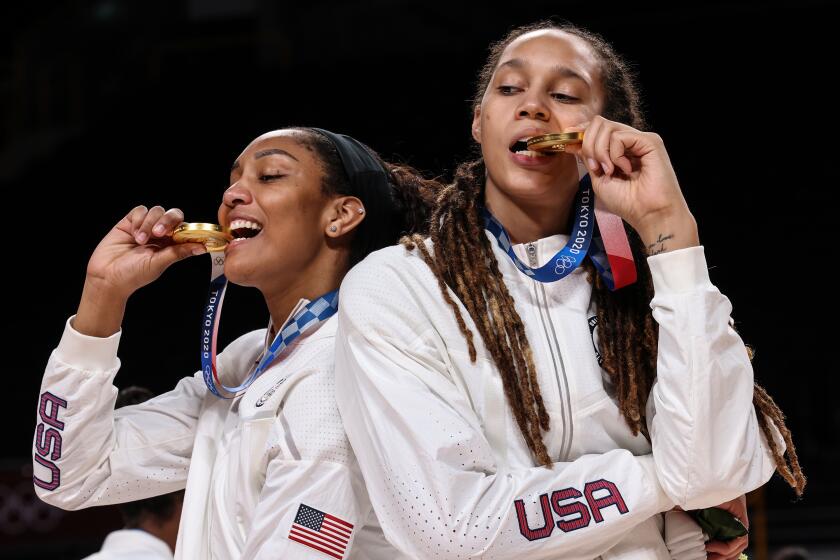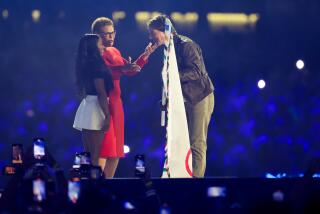‘Curling Night in America’ casts spotlight on quirky but popular Olympic sport
- Share via
Curling enjoyed a moment at the 2018 Winter Olympics when the U.S. men’s team rallied from a poor start to defeat favored Sweden and win the first U.S. gold medal in the sport.
NBCSN’s telecast of the gold medal finale aired from 1:30 a.m. to 3 a.m. Eastern time and earned the second-best late-night ratings in the cable network’s history, testament to the mesmerizing power of briskly sweeping brooms or the novelty of a sport that seems like something you could do in your backyard if your backyard had ice. If not, shuffleboard would be the next-best thing.
Putting microphones on the competitors proved a brilliant idea, capturing strategy sessions and spats and making the participants easily relatable. “There’s a huge human element to it, and I think people really feel they get to know you,” said John Shuster, who determined the U.S. strategy as the team’s skip.
“When you’re watching major sports, like an NFL game, they’ll mike up one player, and you get to see a little bit more into them. As curlers, because we’re miked up all the time for TV because it makes it so much better, I think people really start feeling a connection with us as individuals, and I think that has helped it stay on TV. Because people are like, ‘What are they going to say next?’”
Women win big at Tokyo Olympics, push for more gender-balanced Games as they were staged in an anxious, COVID-driven hush without the energy of fans.
It doesn’t take long to feel like you’d want to go out for a beer with them. “Absolutely,” Shuster agreed. “And you know what, if I was around and they’re around a curling club, we would go out for a beer with them.”
Shuster and gold medal teammate Matt Hamilton were at Great Park Ice in Irvine in August for a competition that was recorded for broadcast on NBCSN’s “Curling Night in America,” which will start its seventh season Sunday. Eighteen hours of coverage will be aired over nine weeks. Men’s and women’s teams from the U.S., Canada, Denmark and Germany participated in the four-day event.
The Irvine ice complex, which houses the Ducks’ practice rink and is the training base for many elite figure skaters — including three-time world champion Nathan Chen — also will host the U.S. mixed doubles 2022 Olympic curling trials Oct. 25-31.
It’s no longer a surprise to see hockey thriving at the recreational, high school and professional levels in Southern California thanks to the ripple effect created when the Kings acquired Wayne Gretzky in 1988. And California has been home to Olympic and world champion figure skaters for decades. Curling isn’t as well-known as those other ice sports, yet it has a small but enthusiastic cult following. The Southern California Curling Center, a dedicated curling facility, recently opened in Vernon, and Westminster Ice has offered curling programs for years.
“Southern California has been fantastic about getting enthused about curling,” Hamilton said. “They just opened their own curling club, which is amazing for a southern state. They have really great energy in the crowds, so it’s fun to bring curling to Southern California and really let these fans show their colors.”
The Orange County Curling Club had about 120 members before the COVID-19 pandemic hit, and it’s back up to about 80 members, according to member Gordon Harder of Huntington Beach. He was delighted to see “Curling Night in America” visit his home ice.
“It’s not quite like the Super Bowl coming to your town, but it’s close,” Harder said. “For curlers, it’s close.”
He and his wife, Gail, and their two sons went to a learn-to-curl event with another family about 10 years ago. They fell “a bunch” but enjoyed it enough to sign up for a league. “My wife wasn’t very athletic,” Harder said, “now she’s hooked. She’d want a new husband if I wanted to stop curling.”
Trenten Merrill is looking forward to competing at the Tokyo Paralympics as he strives to offer a message of hope for amputees and disabled persons.
Harder has traveled around the country to participate in bonspiels, or tournaments. The atmosphere tends to be relaxed and eager to get started on post-competition partying. “People might have a flask every once in a while,” he said. “There is a very social aspect, and a lot of the curlers really enjoy that as much as the competition.”
Winning Olympic gold hasn’t made Hamilton or Shuster rich, but their lives have changed. Hamilton says he gets recognized in public, even in non-traditional curling outposts like California. “That’s the cool part of it,” he said. He still works in research and development for the appliance division of Spectrum Brands. “I’m a normal guy that goes to work on the weekdays,” he said, “and on the weekends, I try and curl really hard and go to the Olympics.”
Shuster, a stay-at-home dad of two, enjoyed medalist perks such as throwing out the first pitch at a Minnesota Twins game and dropping the puck at a Minnesota Wild game against the Kings. He most appreciated another benefit he didn’t expect. “We’ve gotten to share our story and speak with groups around the country and share our medal with as many people as we can share it with,” he said, “because you win a gold medal for your country, not necessarily for yourself, and we really just enjoyed it and revel in sharing it with as many people as possible.”
Hold his beer while the U.S. men curlers try to repeat that magic golden moment.
More to Read
Go beyond the scoreboard
Get the latest on L.A.'s teams in the daily Sports Report newsletter.
You may occasionally receive promotional content from the Los Angeles Times.








